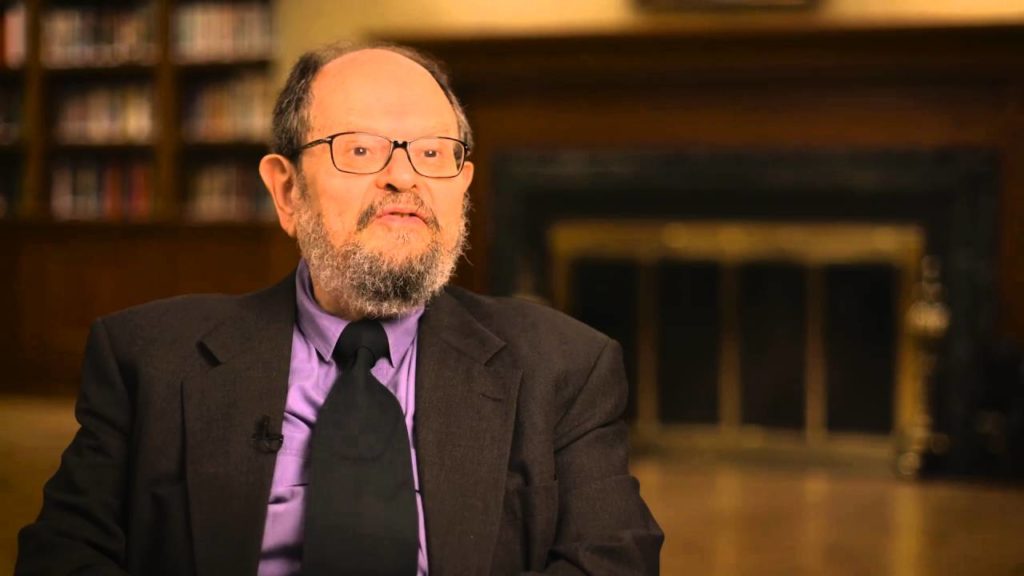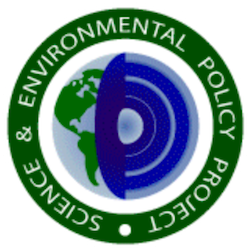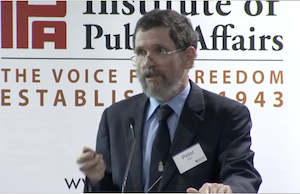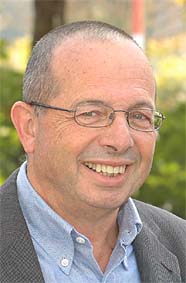Heidelberg Appeal
Background
The Heidelberg Appeal was a document released to coincide with the 1992 Earth Summit in Rio de Janeiro.
According to the American Policy Center, the appeal was initially signed by “425 scientists and other intellectual leaders,” and ultimately signed by 4,000. A complete listing of the 4,000 signatories does not appear readily available online.1“32,000 scientists dissent from global-warming “consensus’,” Association of American Physicians and Surgeons. May 20, 2007. Archived December 16, 2017. Archive.is URL: https://archive.is/Ctd3o
The Appeal took its name from an April 1992 conference in Heidelberg, Germany, that discussed hazardous substance use and was drafted by Dr. Andre Lichnerowicz, and Michel Salomon. A list of 264 initial signers was presented to officials at the Earth Summit in Rio, and later circulated for additional signatures.2“PUBLIC STANCES OF ABEL LAJTHA AND / OR THE N.S. KLINE INSTITUTE,” Businesswire, June 1, 1992. Retrieved from Truth Tobacco Industry Documents library. Bates No. 2063120931-2063120936.
As the full text below shows, the Heidelberg Appeal does not directly address climate change. Despite this, the language is open to interpretation and has been cited by climate change deniers as evidence that there isn’t scientific consensus on climate change due to greenhouse gases.
For example, Mike Catanzaro—who would later go on to be named a top energy policy aide to President Donald Trump—wrote at the National Center for Public Policy Research (NPPR) that the “appeal warns industrialized nations that no compelling scientific consensus exists to justify mandatory greenhouse gas emissions cuts.”3Michael Catanzaro. “SPECIAL REPORT: CLIMATE-GATE: WHAT IS THE PRESIDENT BEING ACCUSED OF, EXACTLY?” National Center for Public Policy Research, January 1, 2003. Archived February 10, 2018. Archive.is URL: https://archive.is/Ob3BN
The Heidelberg Appeal was the product of Michel Salomon and was later associated with his PR group, the International Centre for Scientific Ecology (ICSE). S. Fred Singer, a noted climate change denier, sat on the ICSE board. Tobacco industry documents suggest that APCO Associates was also exploring ways to transform support of the Appeal into a “more ‘formal movement’ internationally” as an extension of The Advancement of Sound Science Coalition (TASSC), a front group for Philip Morris tobacco.4“THOUGHTS ON TASSC EUROPE,” APCO Associates, March 25, 1994. Retrieved from Truth Tobacco Industry Document Library. Bates No. 2025493149-2025493156.
The Heidelberg Appeal is “wholeheartedly supported” by The Committee for a Constructive Tomorrow Europe (CFACT Europe).5“The Heidelberg Appeal (1992),” CFACT-Europe. Archived Apirl 5, 2009. Archive.is URL: https://archive.is/cXxJC
Tobacco Connection
A document from the PR firm Burson Marsteller suggests that the Appeal had established a “network” that would be useful for the tobacco industry’s fight for GEP (Good Epidemiology Practice), describing it as having the potential of being a “sponsor of a GEP seminar and ultimately a more permanent horse to ride.”6“Scientist Project,” Burson Marsteller, June 16, 1994. Retrieved from Truth Tobacco Industry Documents. Bates No. 2025493117.
“Several of TASSC’s scientists have signed the Appeal, providing the opportunity to approach the supporters with a ‘peer to peer’ approach, i.e., a ‘Dear Colleague’ letter,” an APCO Associates document suggests, noting that by signing the Appeal, “this group expressed support of our basic message.”7“THOUGHTS ON TASSC EUROPE,” APCO Associates, March 25, 1994. Retrieved from Truth Tobacco Industry Document Library. Bates No. 2025493149-2025493156.
Tobacco Industry Documents
Appeal Document
The following is listed as the 3rd revision of the Heidelberg Appeal, retrieved from the Truth Tobacco Industry Documents library:8“HEIDELBERG APPEAL TO HEADS OF STATES AND GOVERNMENTS,” April 14, 1992. Retrieved from Truth Tobacco Industry Document Library.
Funding
Tobacco industry documents suggest that Philip Morris (PM) was working, in the words of former PM Public Affairs and Corporate Communications executive Gerald Wirz, “discreetly” to support the ICSE and related Heidelberg Appeal as “some of the coalition members are concerned about a ‘tobacco connection’.”9Gerard Wirz. “SUBJECT: The Heidelberg Appeal,” March 23, 1993. Retrieved from Truth Tobacco Industry Documents Library. Bates No. 2025498346.
“This coalition has its roots in the asbestos industry, but has become a broad and independent movement in a little bit less than a year. We are involved with the coalition through the French NMA, but we are being discreet because some of the coalition members are concerned about a ‘tobacco connection’.
“Our strategy is to continue discreetly supporting the coalition and help it grow in size and credibility. The timing is particularly opportune because of Bill Clinton’s sympathy to the messages of the coalition (see attached IHT article).
“If you would like more information on how to help support the movement, please contact me or Tom Borelli on the US side,” the archived document reads.
Signatories
The Science and Environmental Policy Project (SEPP) website listed a small group of what it claims are “more than 4000 signers”:10“The Heidelberg Appeal,” SEPP.org. Archived April 10, 2009. Archive.is URL: https://archive.is/z5Pkt
- Bruce N. Ames
- Phillip W. Anderson
- Christian B. Anfinsen
- Henri Atlan
- Julius Axelrod
- Aden Bauleiu-Inserm
- Baruj Benacerraf
- Hans Albrecht Bethe
- Sir James W. Black
- Nicholas Bloembergen
- Sir Hermann Bondi
- Norman E Borlaug
- Pierre Bourdieu
- Adolph Butenandt
- Thomas R. Cech
- Carlos Chagas
- Owen Chamberlain
- Stanley Cohen
- Sir John Warcup Cornforth
- Jean Dausset
- Gerald Debreu
- Johan Deisenhofer
- Sir Richard Doll
- Christian de Duve
- Manfred Eigen
- Richard R. Ernst
- Pierre-Gilles de Gennes
- Ivar Giaever
- Donald A. Glaser
- Francois Gros
- Roger Guillemin
- Herbert A. Hauptman
- Harald zur Hausen
- Mrs. Francoise Heritier-Auge
- Dudley R. Herschbach
- Gerhard Herzberg
- Benno Hess
- Anthony Jewish
- Roald Hoffman
- Robert Huber
- Sir Andrew Fielding Huxley
- Serguei Petrovich Kapitza
- Jerome Karle
- Sir John Kendrew
- Klaus Von Klitzing
- Aaron Klug
- Edwin G. Krebs
- Leon Lederman
- Yuan T. Lee
- Jean-Marie Lehn
- Pierre Lelong
- Wassily Leontief
- Rita Levi-Montalcini
- Andr Linchnerowicz
- Richard S. Lindzen
- William N. Lipscomb
- Harry M. Markowitz
- Simon van der Meer
- Cesar Milstein
- Sir. Nevil F. Mott
- Joseph Murray
- Daniel Nathans
- Daniel W. Nebert
- Louis Neel
- Erwin Neher
- Marshall W. Nirenberg
- George E. Palade
- Linus Pauling
- Jean-Claude Pecker
- Amo A. Penzias
- Max Ferdinand Perutz
- Julian Peto
- Richard Peto
- John Charles Polanyi
- Lord George Porter
- I. Prigogine
- A. Prochiantz
- Ichtiaque Rasool
- Tadeus Reichstein
- Heinrich Rohrer
- Bert Sakmann
- Abdus Salam
- Jonas Salk
- Evry Schatzman
- Arthur L. Schawlow
- G. Schettler
- Elie A. Shneour
- Kai Siegbahn
- S. Fred Singer
- Richard Laurence Millington Synge
- GP Talwar
- Jan Tinbergen
- Lord Alexander Todd
- Alvin Toffler
- Charles H. Townes
- Ren Truhaut
- Sir John R. Vane
- Harold E. Varmus
- Thomas Huckle Weller
- Elie Wiesel
- Torsten N. Wiesel
- Robert W. Wilson
Key People
The “International Center for a Scientific Ecology,” which declared that it was created for the purpose to “answer the request from a number of the Heidelberg Appeal signatories in view to extend its impact in examining actual issues the scientific community is confronted with” included the following board members:11”The International Center for a Scientific Ecology,” May 10, 1993. Retrieved from Truth Tobacco Industry Documents Library. Bates No. 500907089-500907252.
- Michel Salomon — listed as the “Coordinator of the Heidelberg Appeal.”12”The International Center for a Scientific Ecology,” May 10, 1993. Retrieved from Truth Tobacco Industry Documents Library. Bates No. 500907089-500907252.
- Pierre Joly — Former President of the International Federation of Pharmaceutical Manufacturers Association.13”The International Center for a Scientific Ecology,” May 10, 1993. Retrieved from Truth Tobacco Industry Documents Library. Bates No. 500907089-500907252.
- Constant Burg — honorary member of the State Council honorary managing director of INSERM. President of the Institut Curie.14”The International Center for a Scientific Ecology,” May 10, 1993. Retrieved from Truth Tobacco Industry Documents Library. Bates No. 500907089-500907252.
- Gilbert Rutman — Chief mining engineer. President of the Conseil National des Ingénieurs et des Scientifiques de France.15”The International Center for a Scientific Ecology,” May 10, 1993. Retrieved from Truth Tobacco Industry Documents Library. Bates No. 500907089-500907252.
- S. Fred Singer — President of the Science and Environmental Policy Project.16”The International Center for a Scientific Ecology,” May 10, 1993. Retrieved from Truth Tobacco Industry Documents Library. Bates No. 500907089-500907252.
- Gary Nash — Secretary General of the International Council on Metals and the Environment (ICME).17”The International Center for a Scientific Ecology,” May 10, 1993. Retrieved from Truth Tobacco Industry Documents Library. Bates No. 500907089-500907252.
Actions
July 20, 1992
Michel Solomon discussed the Heidelberg Appeal in an interview with Ron Kaufman at The Scientist. Excerpts below:18Ron Kaufman. “Rio Document Spurs Debate: Is Science An Ecological Foe?” The Scientist, July 20, 1992. Archive.is URL: https://archive.li/3oHPm
“Explaining the purpose of the Heidelberg Appeal to The Scientist, its author, Michel Salomon, warns that some influential individuals, scientists among them, threaten progress toward environmental improvement by espousing unrealistic theories or ascribing to counterproductive practices. Determination of government policy and the conditioning of public attitudes toward science, says Salomon, the editor of the French science journal Projections, must not be entrusted to ‘a few freaks pretending that things don’t exist.’”
“Salomon cites radical proponents of animal rights as examples of those holding impractical and unproductive ideas; he objects to their belief that ‘a human being should be treated like any worm, elephant, or flower… that they are all equal.’ He singles out a prominent environmental organization, the Sierra Club; as an example of a group harboring an irrational ideology.
‘The Sierra Club believes a contract exists between nature and man…but nature doesn’t speak, so they are the self-proclaimed speakers for nature, which is a very dangerous tendency.’”“Calling for rationality, Salomon says of the Heidelberg Appeal: ‘What we are saying is that damage [to the environment] caused by science can be cured by more science and not by less science.’”
Hilary French, researcher with the Worldwatch Institute in Washington, D.C., attended the Rio summit and said that the Appeal had little impact on the official summit participants. While reportedly agreeing with the general appeal, French said “any thinking environmentalist is pro-science and sees science and technology in a critical role.”19Ron Kaufman. “Rio Document Spurs Debate: Is Science An Ecological Foe?” The Scientist, July 20, 1992. Archive.is URL: https://archive.li/3oHPm
Howard Ris, executive director of the Union of Concerned Scientists (UCS) said that we need to be “cautious about the suggestion that technology alone could solve all our problems,” pointing to climate change and the oil industry:
“How do you explain the coal and oil industry, who [downplay the threat of] climate change on scientific ground? This only masks the fact that they don’t want to change and hurt their profit,” Ris said.20Ron Kaufman. “Rio Document Spurs Debate: Is Science An Ecological Foe?” The Scientist, July 20, 1992. Archive.is URL: https://archive.li/3oHPm
June 1, 1992
A version of the Heidelberg Appeal was published in the Wall Street Journal, featuring the signatures of 46 scientists and intellectuals.21Understanding environmental policy convergence: The power of words, rules and money. Cambridge University Press (2014).
May 10, 1993
A document written by P N Lee, who identifies as a signatory of the Heidelberg Appeal, suggests that the document was signed at a “International Scientific Seminar” organized by the International Center for a Scientific Ecology. The event was held in Paris on May 10, 1993.22“‘IS THE CONCEPT OF LINEAR RELATIONSHIP BETWEEN DOSE AND EFFECT STILL A VALID MODEL FOR ASSESSING RISK RELATED TO LOW DOSES OF CARCINOGENS?’ NOTES ON AN INTERNATIONAL SCIENTIFIC SEMINAR ORGANIZED BY THE INTERNATIONAL CENTER FOR A SCIENTIFIC ECOLOGY HELD ON 930510 IN PARIS,” May 13, 1993. Retrieved from Truth Tobacco Industry Documents. Bates No. 2025498604-2025498615.
“The appeal expressed considerable concern about the emerging irrational ideology opposed to scientific and industrial progress, and emphasized the need for a more rational, scientific approach and less emotional approach in dealing with risks from progress,” Lee wrote.23“‘IS THE CONCEPT OF LINEAR RELATIONSHIP BETWEEN DOSE AND EFFECT STILL A VALID MODEL FOR ASSESSING RISK RELATED TO LOW DOSES OF CARCINOGENS?’ NOTES ON AN INTERNATIONAL SCIENTIFIC SEMINAR ORGANIZED BY THE INTERNATIONAL CENTER FOR A SCIENTIFIC ECOLOGY HELD ON 930510 IN PARIS,” May 13, 1993. Retrieved from Truth Tobacco Industry Documents. Bates No. 2025498604-2025498615.
“The conference was concerned with the appropriateness or otherwise of risk assessment based on linear extrapolation from known risks at high doses, often determined from animal studies.”24“‘IS THE CONCEPT OF LINEAR RELATIONSHIP BETWEEN DOSE AND EFFECT STILL A VALID MODEL FOR ASSESSING RISK RELATED TO LOW DOSES OF CARCINOGENS?’ NOTES ON AN INTERNATIONAL SCIENTIFIC SEMINAR ORGANIZED BY THE INTERNATIONAL CENTER FOR A SCIENTIFIC ECOLOGY HELD ON 930510 IN PARIS,” May 13, 1993. Retrieved from Truth Tobacco Industry Documents. Bates No. 2025498604-2025498615.
Among other conclusions that Lee summarized from the conference, he said “Far too much time and money is spent trying to minimize trivial risks from manmade chemicals, when it is clear that it would be much more time- and cost-efficient to concentrate on, reducing significant risks of cancer and other diseases from other causes.”25“‘IS THE CONCEPT OF LINEAR RELATIONSHIP BETWEEN DOSE AND EFFECT STILL A VALID MODEL FOR ASSESSING RISK RELATED TO LOW DOSES OF CARCINOGENS?’ NOTES ON AN INTERNATIONAL SCIENTIFIC SEMINAR ORGANIZED BY THE INTERNATIONAL CENTER FOR A SCIENTIFIC ECOLOGY HELD ON 930510 IN PARIS,” May 13, 1993. Retrieved from Truth Tobacco Industry Documents. Bates No. 2025498604-2025498615.
April 14, 1992
The initial Heidelberg conference was a one-day symposium that took place in Heidelberg, Germany, and consisted of roughly 50 European scientists. The Heidelberg meeting included “Experts in CFCs, dioxins, radiation and asbestos.” According to archived tobacco industry documents, while the primary focus of the conference was not on Rio, “the question of the upcoming Earth Summit preoccupied the participants too much for them to stop at purely technical discussions. We were therefore not overly surprised when numerous voices were raised wanting the group to discuss Rio and to adopt a definite position on the matter.”26“FROM HEIDELBERG TO RIO ITINERARY OF AN APPROACH,” 1992. Retrieved from Truth Tobacco Industry Documents library. Bates No. 2025477480-2025477483.
“The Heidelberg appeal was truly not conceived in a spirit of aggressivity against anyone, nor does it express a sense of frustration; it is not a political approach and it does not seek to defend corporate interests,” Michel Solomon claimed in a document outlining the Appeal’s creation.27“FROM HEIDELBERG TO RIO ITINERARY OF AN APPROACH,” 1992. Retrieved from Truth Tobacco Industry Documents library. Bates No. 2025477480-2025477483.
Related Organizations
- The International Center for a Scientific Ecology (ICSE)
- The Advancement of Sound Science Coalition (TASSC)
Other Resources
- “Heidelberg Appeal,” Wikipedia.
- “Heidelberg Appeal,” SourceWatch.
Resources
- 1“32,000 scientists dissent from global-warming “consensus’,” Association of American Physicians and Surgeons. May 20, 2007. Archived December 16, 2017. Archive.is URL: https://archive.is/Ctd3o
- 2“PUBLIC STANCES OF ABEL LAJTHA AND / OR THE N.S. KLINE INSTITUTE,” Businesswire, June 1, 1992. Retrieved from Truth Tobacco Industry Documents library. Bates No. 2063120931-2063120936.
- 3Michael Catanzaro. “SPECIAL REPORT: CLIMATE-GATE: WHAT IS THE PRESIDENT BEING ACCUSED OF, EXACTLY?” National Center for Public Policy Research, January 1, 2003. Archived February 10, 2018. Archive.is URL: https://archive.is/Ob3BN
- 4“THOUGHTS ON TASSC EUROPE,” APCO Associates, March 25, 1994. Retrieved from Truth Tobacco Industry Document Library. Bates No. 2025493149-2025493156.
- 5“The Heidelberg Appeal (1992),” CFACT-Europe. Archived Apirl 5, 2009. Archive.is URL: https://archive.is/cXxJC
- 6“Scientist Project,” Burson Marsteller, June 16, 1994. Retrieved from Truth Tobacco Industry Documents. Bates No. 2025493117.
- 7“THOUGHTS ON TASSC EUROPE,” APCO Associates, March 25, 1994. Retrieved from Truth Tobacco Industry Document Library. Bates No. 2025493149-2025493156.
- 8“HEIDELBERG APPEAL TO HEADS OF STATES AND GOVERNMENTS,” April 14, 1992. Retrieved from Truth Tobacco Industry Document Library.
- 9Gerard Wirz. “SUBJECT: The Heidelberg Appeal,” March 23, 1993. Retrieved from Truth Tobacco Industry Documents Library. Bates No. 2025498346.
- 10“The Heidelberg Appeal,” SEPP.org. Archived April 10, 2009. Archive.is URL: https://archive.is/z5Pkt
- 11”The International Center for a Scientific Ecology,” May 10, 1993. Retrieved from Truth Tobacco Industry Documents Library. Bates No. 500907089-500907252.
- 12”The International Center for a Scientific Ecology,” May 10, 1993. Retrieved from Truth Tobacco Industry Documents Library. Bates No. 500907089-500907252.
- 13”The International Center for a Scientific Ecology,” May 10, 1993. Retrieved from Truth Tobacco Industry Documents Library. Bates No. 500907089-500907252.
- 14”The International Center for a Scientific Ecology,” May 10, 1993. Retrieved from Truth Tobacco Industry Documents Library. Bates No. 500907089-500907252.
- 15”The International Center for a Scientific Ecology,” May 10, 1993. Retrieved from Truth Tobacco Industry Documents Library. Bates No. 500907089-500907252.
- 16”The International Center for a Scientific Ecology,” May 10, 1993. Retrieved from Truth Tobacco Industry Documents Library. Bates No. 500907089-500907252.
- 17”The International Center for a Scientific Ecology,” May 10, 1993. Retrieved from Truth Tobacco Industry Documents Library. Bates No. 500907089-500907252.
- 18Ron Kaufman. “Rio Document Spurs Debate: Is Science An Ecological Foe?” The Scientist, July 20, 1992. Archive.is URL: https://archive.li/3oHPm
- 19Ron Kaufman. “Rio Document Spurs Debate: Is Science An Ecological Foe?” The Scientist, July 20, 1992. Archive.is URL: https://archive.li/3oHPm
- 20Ron Kaufman. “Rio Document Spurs Debate: Is Science An Ecological Foe?” The Scientist, July 20, 1992. Archive.is URL: https://archive.li/3oHPm
- 21Understanding environmental policy convergence: The power of words, rules and money. Cambridge University Press (2014).
- 22“‘IS THE CONCEPT OF LINEAR RELATIONSHIP BETWEEN DOSE AND EFFECT STILL A VALID MODEL FOR ASSESSING RISK RELATED TO LOW DOSES OF CARCINOGENS?’ NOTES ON AN INTERNATIONAL SCIENTIFIC SEMINAR ORGANIZED BY THE INTERNATIONAL CENTER FOR A SCIENTIFIC ECOLOGY HELD ON 930510 IN PARIS,” May 13, 1993. Retrieved from Truth Tobacco Industry Documents. Bates No. 2025498604-2025498615.
- 23“‘IS THE CONCEPT OF LINEAR RELATIONSHIP BETWEEN DOSE AND EFFECT STILL A VALID MODEL FOR ASSESSING RISK RELATED TO LOW DOSES OF CARCINOGENS?’ NOTES ON AN INTERNATIONAL SCIENTIFIC SEMINAR ORGANIZED BY THE INTERNATIONAL CENTER FOR A SCIENTIFIC ECOLOGY HELD ON 930510 IN PARIS,” May 13, 1993. Retrieved from Truth Tobacco Industry Documents. Bates No. 2025498604-2025498615.
- 24“‘IS THE CONCEPT OF LINEAR RELATIONSHIP BETWEEN DOSE AND EFFECT STILL A VALID MODEL FOR ASSESSING RISK RELATED TO LOW DOSES OF CARCINOGENS?’ NOTES ON AN INTERNATIONAL SCIENTIFIC SEMINAR ORGANIZED BY THE INTERNATIONAL CENTER FOR A SCIENTIFIC ECOLOGY HELD ON 930510 IN PARIS,” May 13, 1993. Retrieved from Truth Tobacco Industry Documents. Bates No. 2025498604-2025498615.
- 25“‘IS THE CONCEPT OF LINEAR RELATIONSHIP BETWEEN DOSE AND EFFECT STILL A VALID MODEL FOR ASSESSING RISK RELATED TO LOW DOSES OF CARCINOGENS?’ NOTES ON AN INTERNATIONAL SCIENTIFIC SEMINAR ORGANIZED BY THE INTERNATIONAL CENTER FOR A SCIENTIFIC ECOLOGY HELD ON 930510 IN PARIS,” May 13, 1993. Retrieved from Truth Tobacco Industry Documents. Bates No. 2025498604-2025498615.
- 26“FROM HEIDELBERG TO RIO ITINERARY OF AN APPROACH,” 1992. Retrieved from Truth Tobacco Industry Documents library. Bates No. 2025477480-2025477483.
- 27“FROM HEIDELBERG TO RIO ITINERARY OF AN APPROACH,” 1992. Retrieved from Truth Tobacco Industry Documents library. Bates No. 2025477480-2025477483.




